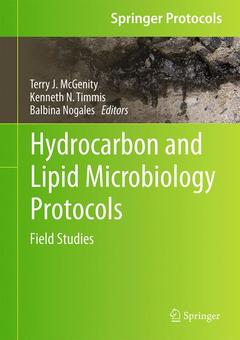Hydrocarbon and Lipid Microbiology Protocols, Softcover reprint of the original 1st ed. 2017 Field Studies Springer Protocols Handbooks Series

This Volume describes methods for investigating microbes in their natural environment and how to obtain representative samples and preserve them for subsequent analyses. Chapters are arranged according to the environments under investigation, which include: oil reservoirs, fracking fluids, aquifers, coal beds, oil sands and their tailing ponds, lakes, rivers, leaves, polar seas and ice, the sea-surface microlayer, mud flats, microbialites, and deep-sea fauna. A variety of downstream analytical procedures are described, including: nucleic-acid extraction and preparation for high-throughput sequencing, fluorescence in-situ hybridisation, and cultivation of aerobic and anaerobic hydrocarbon-degrading microbes. Though most chapters focus on hydrocarbon-rich environments, many of the approaches used are generic, and as such will be of value to researchers embarking on studies of microbes and their processes in the field.
Hydrocarbon and Lipid Microbiology ProtocolsThere are tens of thousands of structurally different hydrocarbons, hydrocarbon derivatives and lipids, and a wide array of these molecules are required for cells to function. The global hydrocarbon cycle, which is largely driven by microorganisms, has a major impact on our environment and climate. Microbes are responsible for cleaning up the environmental pollution caused by the exploitation of hydrocarbon reservoirs and will also be pivotal in reducing our reliance on fossil fuels by providing biofuels, plastics and industrial chemicals. Gaining an understanding of the relevant functions of the wide range of microbes that produce, consume and modify hydrocarbons and related compounds will be key to responding to these challenges. This comprehensive collection of current and emerging protocols will facilitate acquisition of this understanding and exploitation of useful activities of such microbes.
Date de parution : 12-2016
Ouvrage de 362 p.
17.8x25.4 cm
Date de parution : 07-2018
Ouvrage de 362 p.
17.8x25.4 cm



